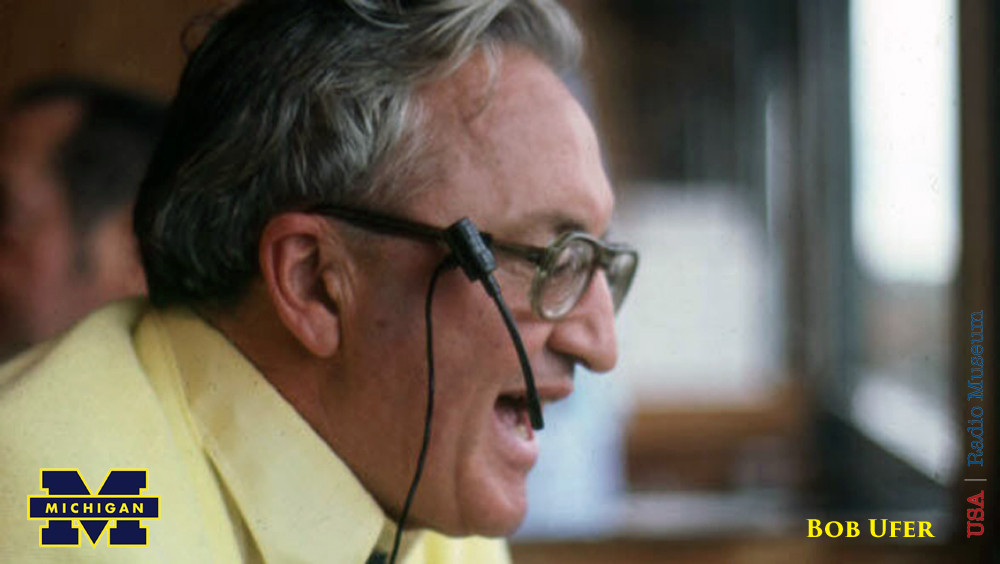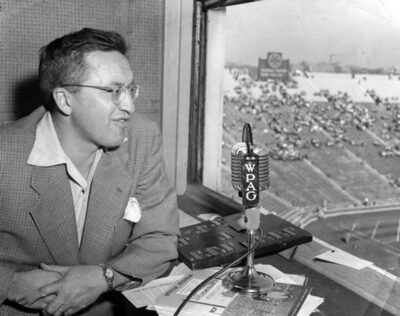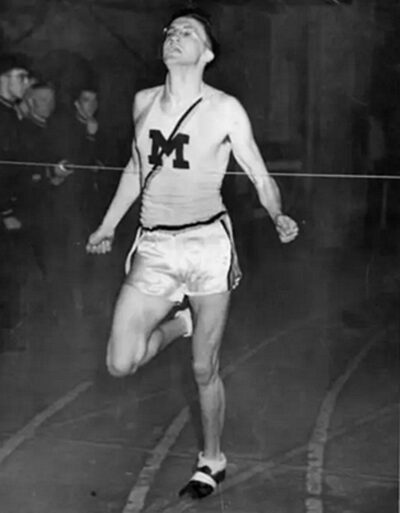“Meesh-ee-gun!”: The Echo of a Voice That Never Fades There are voices that narrate the game—and then there are voices that define it. For gene
“Meesh-ee-gun!”: The Echo of a Voice That Never Fades
There are voices that narrate the game—and then there are voices that define it. For generations of Michigan Wolverines fans, Bob Ufer wasn’t just the soundtrack of autumn Saturdays—he was the embodiment of maize-and-blue passion, a one-man pep rally whose exuberance spilled from the radio and into the soul of Michigan Stadium itself.
From the moment he took the mic in 1945 until his final broadcast in 1981, Ufer transformed play-by-play into poetry, statistics into storytelling, and touchdowns into triumphs of the human spirit. With his signature “Meesh-ee-gun!” cry, his honking Patton jeep horn, and his unapologetic love for the Wolverines, Ufer didn’t just call the game—he lived it, breathed it, and bled it.
This is not merely a tribute to a broadcaster. It is a celebration of a man whose voice became legend, whose legacy endures in every echo of the Big House, and whose spirit still rides shotgun with every Michigan fan who dares to dream. — USA RADIO MUSEUM
_____________________
From Track Star to Torchbearer: The Making of Bob Ufer
Born in Pennsylvania in 1920, Bob Ufer arrived at the University of Michigan not just as a student, but as a blazing talent on the track. A gifted sprinter, Ufer shattered records in the 440-yard dash and earned All-American honors, setting a national collegiate record that stood for eight years. His athleticism wasn’t just raw speed—it was a reflection of his relentless drive, his competitive fire, and his deep love for the maize and blue.
But Ufer’s legacy wasn’t destined to be confined to the lanes of Ferry Field. After serving in World War II, he returned to Ann Arbor with a new mission: to bring Michigan Football to life for fans across the state. What began as a post-war pivot soon became a lifelong calling. His experience as an athlete gave him a rare empathy for the players he covered—he didn’t just describe their feats, he felt them.
The Spark Behind the Microphone: Ufer’s Early Radio Passion and Path to the Wolverines Booth
Bob Ufer’s journey to the broadcast booth wasn’t a straight line—it was a winding road paved with athletic glory, wartime service, and an irrepressible love for storytelling. Though best known for his thunderous football calls, Ufer’s fascination with radio began in the 1940s, when the medium was still in its golden age. After graduating from the University of Michigan in 1943 with a degree in history—and having already etched his name into track and field record books—Ufer served in the U.S. Army during World War II. Upon returning home, he found himself drawn not just to business, founding Ufer & Co. Insurance in 1947, but to the airwaves.
His charisma, booming voice, and natural flair for dramatics made him a perfect fit for radio. In 1945, he landed a spot on Ann Arbor’s WPAG, where he began calling Michigan Football games. It wasn’t just a job—it was a calling. Ufer’s deep ties to the university, his athletic background, and his infectious enthusiasm made him uniquely suited to bring the Wolverines to life for listeners across the state. He didn’t just report the action—he relived it, injecting every play with the kind of emotional intensity that only a true Michigan man could muster.
By the time he transitioned to Detroit’s WJR in 1977, Ufer had already become a fixture in Michigan households. But it all began with a young man who loved his alma mater, loved the sound of radio, and believed that football was more than a game—it was a sport worth shouting from the rooftops.
The Soundtrack of Saturdays: Uferisms and the Art of Passionate Play-by-Play
![]() Bob Ufer didn’t just call football games—he conducted them. His broadcasts were symphonies of emotion, punctuated by poetic flourishes, spontaneous metaphors, and a voice that could swing from thunderous celebration to heartfelt reverence in a single breath. He was a self-proclaimed “homer,” and he wore that badge with pride. In an era when neutrality was the norm, Ufer’s unabashed love for the Wolverines made him a beacon for fans who wanted more than just the score—they wanted soul.
Bob Ufer didn’t just call football games—he conducted them. His broadcasts were symphonies of emotion, punctuated by poetic flourishes, spontaneous metaphors, and a voice that could swing from thunderous celebration to heartfelt reverence in a single breath. He was a self-proclaimed “homer,” and he wore that badge with pride. In an era when neutrality was the norm, Ufer’s unabashed love for the Wolverines made him a beacon for fans who wanted more than just the score—they wanted soul.
His signature cry of “Meesh-ee-gun!”—drawn from the legendary Fielding Yost—became a rallying call for generations. And then there was the Patton horn: a literal World War II jeep horn that Ufer blasted after every Michigan touchdown, a sonic boom of victory that echoed through radios and hearts alike.
But what truly set Ufer apart were his “Uferisms”—those colorful, often hilarious turns of phrase that became part of Michigan lore. He spoke of players having “cotton-pickin’ Maize and Blue hearts,” described touchdowns as “six points for the Maize and Blue cause,” and once famously referred to Bo Schembechler as “General Bo Schembechler Patton in a maize and blue uniform.” These weren’t just lines—they were declarations of devotion, crafted with the kind of poetic fire that only Ufer could conjure.
His broadcasts were more than commentary—they were theater. And in that theater, Bob Ufer was the star, the narrator, and the most loyal fan in the house.
WPAG-AM | Michigan Wolverines vs Ohio State Buckeyes | November 20, 1976
Audio Digitally Remastered by USA Radio Museum
Moments That Echo Forever: Ufer’s Most Iconic Calls
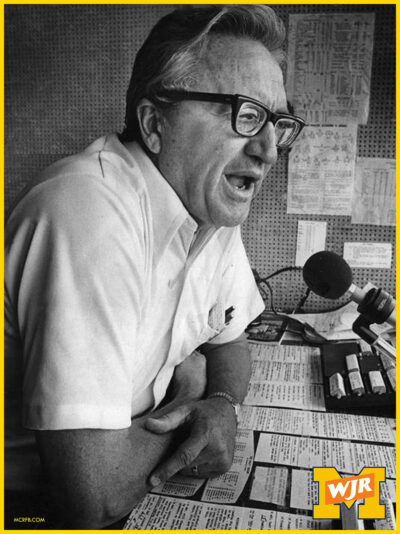 If Bob Ufer’s voice was the heartbeat of Michigan Football, then his most iconic calls were its thunderclaps—moments so electrifying they still reverberate through time. Among the most legendary was his call of Anthony Carter’s game-winning touchdown against Indiana in 1979. With no time left on the clock, Carter hauled in a pass from John Wangler and dashed into the end zone. Ufer erupted: “Johnny Wangler to Anthony Carter! Will you believe this! … Oh my God, Carter scored! … Football’s Valhalla!”
If Bob Ufer’s voice was the heartbeat of Michigan Football, then his most iconic calls were its thunderclaps—moments so electrifying they still reverberate through time. Among the most legendary was his call of Anthony Carter’s game-winning touchdown against Indiana in 1979. With no time left on the clock, Carter hauled in a pass from John Wangler and dashed into the end zone. Ufer erupted: “Johnny Wangler to Anthony Carter! Will you believe this! … Oh my God, Carter scored! … Football’s Valhalla!”
It wasn’t just the play—it was the emotion. Ufer’s voice cracked with joy, disbelief, and sheer Michigan pride. That call has been replayed countless times, not just for its drama, but for the raw humanity Ufer poured into it.
Another unforgettable moment came in 1971, when Billy Taylor broke loose for a 21-yard touchdown against Ohio State. Ufer’s call was a crescendo of jubilation: “Touchdown Billy Taylor! Touchdown Billy Taylor! Touchdown Billy Taylor!”—each repetition louder, more triumphant than the last.
And then there were the poetic flourishes: “God bless your cotton-pickin’ maize and blue hearts!” “We saw it 39 years ago!” “Oh, we’re not excited—not one damn bit!”
These weren’t just catchphrases. They were declarations of love, loyalty, and legacy. Ufer’s calls weren’t about polish—they were about passion. He gave fans permission to feel deeply, to cheer wildly, and to believe fiercely.
Bo and Bob: A Michigan Brotherhood
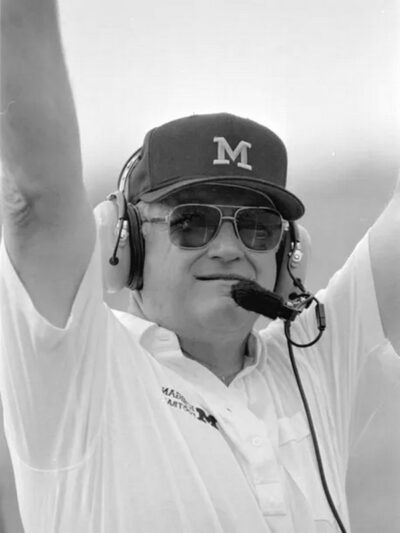 In the storied annals of Michigan Football, few relationships shine brighter than the one shared between Bo Schembechler, the fiery head coach, and Bob Ufer, the impassioned voice of the Wolverines. Though they occupied different roles—Bo on the sidelines, Ufer in the booth—they were united by a singular devotion to the Maize and Blue.
In the storied annals of Michigan Football, few relationships shine brighter than the one shared between Bo Schembechler, the fiery head coach, and Bob Ufer, the impassioned voice of the Wolverines. Though they occupied different roles—Bo on the sidelines, Ufer in the booth—they were united by a singular devotion to the Maize and Blue.
When Bo arrived in Ann Arbor in 1969, Ufer instantly recognized a kindred spirit. He didn’t just admire Bo—he exalted him. In one of his most famous broadcasts, Ufer likened Bo to General George Patton, declaring, “He’s the Patton of football, the Field Marshal of the Maize and Blue!” Ufer even named his iconic touchdown horn the “General Bo Patton Schembechler Horn”, blasting it triumphantly after every Michigan score.
Their bond extended far beyond the field. Ufer saw in Bo the embodiment of Michigan toughness, discipline, and pride. Bo, in turn, respected Ufer’s unwavering loyalty and emotional investment. He knew that Ufer wasn’t just narrating games—he was living them, heart and soul.
When Bob Ufer passed away in October 1981, Bo’s grief was palpable. Though no formal public tribute was recorded at the time, Bo’s later reflections spoke volumes. In one remembrance, he said:
“As I stand here, I just know that Bob Ufer is looking down at me from up there in football’s Valhalla and he’s saying to me… ‘Bo, you can do it. Meeechigan can do it. Meeechigan can do anything.’”
That quote wasn’t just sentiment—it was a salute. A coach honoring a broadcaster. A friend honoring a brother.
And fittingly, Bo and Bob shared the same birthday—April 1st. A poetic detail that underscores the synchronicity of their lives and legacies.
Together, they helped define an era. Bo with his grit and game plans. Bob with his voice and vision. Two Michigan men. One unbreakable bond. And a legacy that still roars through the Big House every fall.
The Final Broadcast: A Last Roar Before Goodbye
In October 1981, Bob Ufer was already stricken with cancer. But true to form, he refused to let illness silence his voice. On Saturday, October 17, he called his final Michigan Football game—just nine days before his passing. His voice, though weakened, still carried the fire of a man who lived for those moments. It was as if Ufer knew this would be his last chance to stand alongside his beloved team, to give one more “Meesch-ee-gun!” to the world.
When he passed away on Monday, October 26, 1981, at age 61, the Michigan community mourned not just a broadcaster, but a brother, a father figure, a friend. The silence that followed was deafening—not because the sound was gone, but because the soul behind it had soared.
_____________________
A Voice Remembered: Mike Whorf’s Tribute on WJR
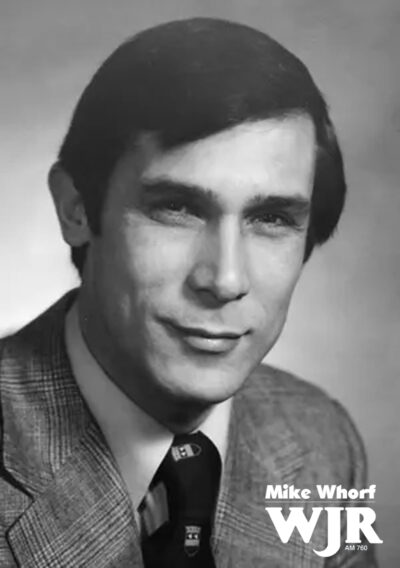 On the evening of Monday, October 26, 1981, just hours after Bob Ufer passed away, WJR Radio in Detroit aired a special program that would become one of the most heartfelt tributes in sports broadcasting history. Written, narrated, and produced by Mike Whorf, the segment was more than a eulogy—it was a celebration of a man whose voice had become the emotional compass for Michigan Football fans across generations.
On the evening of Monday, October 26, 1981, just hours after Bob Ufer passed away, WJR Radio in Detroit aired a special program that would become one of the most heartfelt tributes in sports broadcasting history. Written, narrated, and produced by Mike Whorf, the segment was more than a eulogy—it was a celebration of a man whose voice had become the emotional compass for Michigan Football fans across generations.
Whorf, himself a masterful storyteller, wove together archival clips, personal reflections, and stirring narration to paint a portrait of Ufer not just as a broadcaster, but as a beloved figure whose passion transcended the press box. The tribute was re-aired on Saturday, October 31, allowing fans one more chance to hear the voice that had guided them through decades of triumphs and heartbreaks.
Listeners were reminded of Ufer’s boundless energy, his poetic flair, and his deep emotional connection to the team. The broadcast included some of his most iconic calls, interspersed with reflections on his life, his battle with cancer, and the indelible mark he left on the University of Michigan and the sport itself.
It wasn’t just a radio program—it was a communal moment of mourning and celebration. For many, it felt like saying goodbye to a friend. And for the USA Radio Museum, which now preserves this tribute, it remains a testament to the power of radio to capture not just sound, but spirit.
You can listen to the full WJR tribute (below)–courtesy the USA Radio Museum archive–a must for anyone who wants to feel the heartbeat of Michigan Football through the voice that made it immortal.
WJR Radio 760 | A Tribute to Bob Ufer | October 26, 1981
Audio Digitally Remastered by USA Radio Museum | A USARM Note: Mike Whorf, host of WJR’s ‘Kaleidoscope’ in the 1960s, passed away on November 10, 2020. He was 88.
_____________________
Legacy Etched in Maize and Blue: Ufer’s Lasting Impact
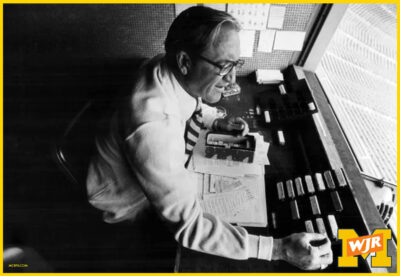 Bob Ufer’s legacy isn’t confined to the archives of radio or the annals of Michigan Football—it lives on in the hearts of fans, in the traditions of the Big House, and in the very culture of college sports broadcasting. Over the course of 362 consecutive games, Ufer didn’t just narrate football—he defined it for an entire generation. His voice became synonymous with autumn Saturdays, his passion a benchmark for broadcasters who followed.
Bob Ufer’s legacy isn’t confined to the archives of radio or the annals of Michigan Football—it lives on in the hearts of fans, in the traditions of the Big House, and in the very culture of college sports broadcasting. Over the course of 362 consecutive games, Ufer didn’t just narrate football—he defined it for an entire generation. His voice became synonymous with autumn Saturdays, his passion a benchmark for broadcasters who followed.
Even today, his influence is felt. The Bob Ufer Quarterback Club continues to celebrate his memory, gathering fans and alumni to honor the man who gave voice to their pride. His signature “Meeechigan!” cry is still echoed in stadium chants and pregame rituals. And for aspiring broadcasters, Ufer remains a gold standard—not for neutrality, but for authenticity, for heart, and for the courage to love the game out loud.
He was inducted into the University of Michigan Athletic Hall of Honor in 1978, alongside legends like Gerald Ford and Tom Harmon—a fitting tribute to a man whose contributions transcended Michigan football through the medium of radio play0by-play broadcasting–first in Ann Arbor–and throughout the State of Michigan and beyond.
Honors and Recognition: Celebrating Ufer’s Achievements
Bob Ufer was inducted into the University of Michigan Athletic Hall of Honor in 1978, part of the inaugural class that included fellow legends like Gerald Ford, Tom Harmon, and Cazzie Russell. This prestigious recognition celebrated not only his record-setting achievements as a track star but also his unparalleled contributions to Michigan Football as its most iconic voice.
In 1980, during the annual Michigan Football Bust, Ufer was honored with a special award for his decades of service and devotion to the program. Though too ill to attend, Coach Bo Schembechler accepted the award on his behalf, a moment that underscored the deep respect Ufer commanded within the Michigan community.
These honors reflect more than accolades—they represent the enduring impact of a man whose voice became part of the very fabric of Michigan sports history.
Finale: The Voice That Still Roars
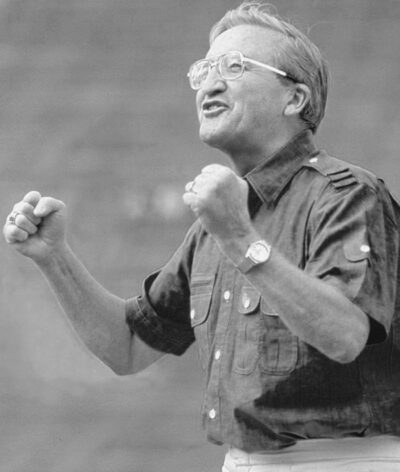 Bob Ufer didn’t just call football games—he called us home. To the Big House. To tradition. To the unshakable pride of being a Michigan Wolverine. His voice was a beacon, his words a rallying cry, and his spirit a reminder that sports are not just contests—they are communities, built on emotion, memory, and shared devotion.
Bob Ufer didn’t just call football games—he called us home. To the Big House. To tradition. To the unshakable pride of being a Michigan Wolverine. His voice was a beacon, his words a rallying cry, and his spirit a reminder that sports are not just contests—they are communities, built on emotion, memory, and shared devotion.
Even in his final days, stricken with cancer, Ufer chose the booth over the bed. He gave us one last game, one last roar, one last reminder of what it means to live with purpose and passion. And when he passed, the silence was deafening—not because the sound was gone, but because the soul behind it had soared.
Yet Bob Ufer’s voice was never meant to fade. It was meant to echo. In every Michigan touchdown. In every fan’s cheer. In every broadcaster who dares to feel as deeply as he did. His legacy is not just preserved in recordings or tributes—it lives in the very heartbeat of Michigan Football.
So here’s to Bob Ufer—the heartbeat of Michigan Football, the poet of the press box, and the voice that still roars in the hearts of Wolverine football fans everywhere, forever seared and remembered as the most iconic, passionate broadcasting voice of the maize and blue to ever rise above the roar of the crowd, carried on the wings of memory, in football’s Valhalla where legends never fade.
_____________________
A USARM Viewing Tip: On your PC? Mouse/click over each image for expanded views. On your mobile or tablet device? Finger-tap all the above images inside the post and stretch image across your device’s screen for LARGEST digitized view. Then click your brower’s back arrow to return to the featured post.

